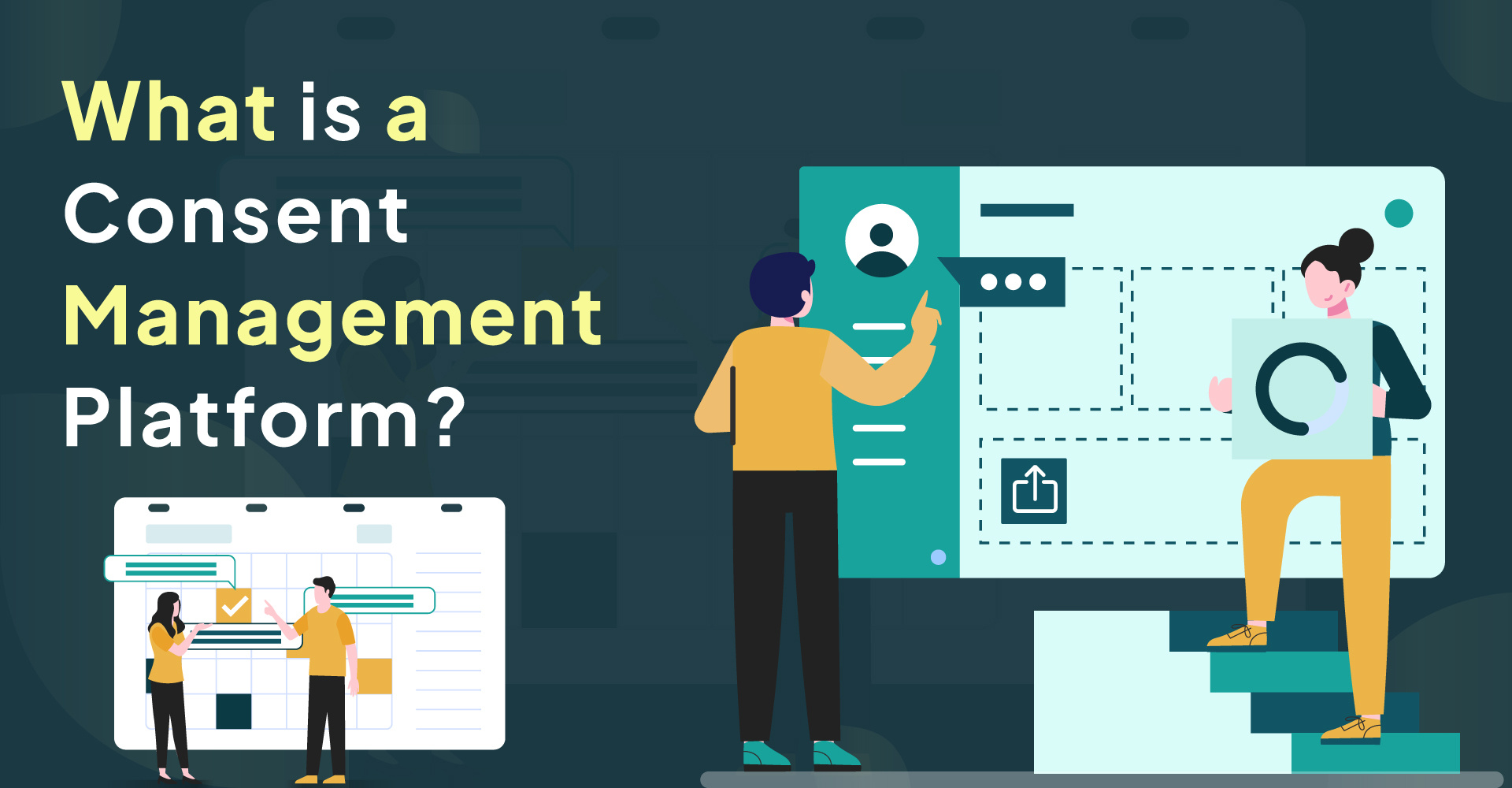What is a Consent Management Platform? | Enzuzo

Table of Contents
The volume of data generated on the internet every day has grown exponentially in recent years.
In this article, we’ll provide a full breakdown of how a consent management platform (CMP) can help you manage user consent, data and privacy requirements under policies such as GDPR and the CCPA in California. We will cover topics including CMP data, CMP privacy, and consent lifecycle management.
What is Consent Management?
Consent management (also known as user consent management) is the term used for the process of managing the individual rights of users to opt in or out and give consent to an organization to use certain types of personal data.
When you consider a single website might have anywhere from a few thousand to a few million users, it is clear that there is a lot of user consent information that needs to be recorded even for small businesses.
What is a Consent Management Platform?
A consent management platform is one of the most effective ways to manage user consent and enable data processing and use within legal guidelines.
In simple terms, a consent management platform is a software tool that helps websites securely collect and manage the user consent needed in order to process personal data.
Websites worldwide must obtain user consent for the use of website cookies and user data collection. By accepting or declining cookies, users can opt in or opt out of data collection or customize the type of information a website is allowed to capture about them.

Screenshot above shows Enzuzo's consent management interface
What Does a Consent Management Platform do?
Managing user consent has become increasingly important worldwide because websites are legally required to obtain user consent before collecting data through cookies while browsing. Under laws such as GDPR and CCPA, companies that fail to respect user consent and misuse subjects' data are subject to huge fines.
A good consent management platform helps an organization to navigate the whole process by making privacy and consent management easier while also making information on how that data is stored, processed and used more transparently for data subjects.
The main tasks a CMP can help organizations complete and manage are detailed in the table below.
|
Action |
Process |
|
Automatic blocking of third party cookies |
A CMP will automatically scan and update your website cookies list. It will also block cookies from being enabled on your website before a user gives their consent. |
|
Collection of user consent |
At the first interaction, the user must be informed that the website collects data and then given a choice to either opt in or out. A CMP helps manage the opt-in/ opt-out banner the user interacts with to give or deny consent. It should also provide the option to revoke consent at any time. |
|
Associating a user's identity with their consent |
A consent management platform can help you associate a user’s identity with their consent, so you can be sure that the person who gave consent is actually the same person who is using your website or product. |
|
Consent logging |
The CMP records the consent choices of each user through consent logging. |
|
Archiving consent records |
A CMP can archive and store consent records to help with audits and prevent fines. |
|
Deliver a frictionless user experience |
Businesses need to balance robust compliance with frictionless user experiences. A good CMP can help in both areas. |
|
Analytics |
A CMP can provide an overview of the entire consent system for the organization, allowing for insights to inform strategy and improvements. |
How Does a Consent Management Platform Help Manage Cookies?
Strictly necessary cookies are the only cookies exempt from requiring user consent. Strictly necessary cookies enable access to required features of the website, including signing in, adding items to a cart, or e-billing.
All other cookies, for example, first-party cookies, third-party cookies, security cookies, tracking, advertising, and targeting cookies all require user consent.
In January 2024, Google started a trial to automatically block third-party cookies for 1% of Chrome browser users. The aim is to roll this out fully by the end of 2024. Google is doing this because it is concerned about the lack of privacy and transparency offered by third-party cookies (this type of cookie relates mostly to advertisers).
This change means that businesses will have to rely more on first-party cookies and the data they get from customers browsing directly on the company website. Encouraging consent for data sharing and processing will be vital in order to understand consumers and optimize messaging to convert sales.
A consent management platform is a great tool for managing this information over time in a legally compliant manner.
User data is valuable for companies in sales and marketing efforts, but also in providing tailored content and experiences in order to provide more value and a more satisfying experience for the user. However, in order to be able to benefit from this companies need to comply with the law or could face consequences that devastate the business.
How Does a Consent Management Platform Work?
Various consent management platforms on the market work in different ways. A good CMP will integrate all your front-end consent collection channels, including your website, CRM system, mobile app, and marketing platforms.
Once the platform collects consent from the various channels mentioned above, it can store, manage and process the data securely in a central repository. The consent repository should be designed as a secure database. Using a single database as the single authority on user consent in your organization provides clarity and less chance of errors being made across various data sets.
👉 Read our review of the best consent management platforms
A CMP will also provide a clear view of personal data activities so that you can demonstrate compliance for any data subject as required.
Here are some additional tasks that consent management platforms cover:
1. Process Automation
A good CMP will have automation built in to remove a lot of time-consuming and repetitive tasks related to consent management. These include:
- Applying automatic updates to consents when the law changes
- Analyzing the consent data and providing analytics
- Manage and update opt-in notices and send them to all consent collection interfaces
2. Consent Lifecycle Management
While not all data privacy laws set an expiration period for consent, lawmakers and consumers will expect you to specify one.
For example, the ePrivacy Directive states websites should renew Cookie Consent at least once a year, while in Europe, the French Data Protection Authority and the Irish Data Protection Commission suggest a shorter 6-month Cookie Consent duration. Most companies renew cookie consent within 1 year.
Once the data retention period expires, collected personal data should be removed. This can mean either completely deleting the data or anonymizing it so it is no longer associated with the user. A good CMP will offer a consent lifecycle solution to help an organization manage this process.
For example, a CMP can manage personal data after consent withdrawal, and handle data removal. This can be an automated process and reduce manual tasks for your team.
This step in consent management is very important because retention and removal policies are often overlooked without an automated process in place. If personal data is not deleted within the required time period it can result in a violation of fair information practices and the General Data
3. Compliance and Audit Trails
A compliant GDPR CMP can help remove the risk of costly fines and reputational damage related to mishandling of personal data consent. It also includes proof of consent for audit and data transparency purposes.
👉 Start building your free consent manager (no credit card necessary)
Do I Need a Consent Management Platform?
If you think about the complexity of building and implementing a custom-built solution to handle the tasks we have discussed in this article, it is likely that a GDPR consent manager will provide many advantages.
Implementing an out-of-the-box product is much faster and more cost-effective, and working with consent management experts can significantly accelerate the project.
A consent management platform helps increase the efficiency of your processes, ultimately saving time, automating repetitive tasks, and allowing your team to be productive in other aspects of the business. Through automation and the centralization of information, you can free up time to focus on other efforts that grow your business.
Here are some benefits of consent management that the right CMP can unlock.
Improved User Experience
Using a consent management platform boosts user experience and trust. By simplifying the consent process with a CMP, you can make it easier for users to understand what they’re consenting to with their data.
As we discussed, with the automatic blocking of third-party cookies in the near future, persuading users to give you consent on your website will become more important. A CMP can make it more likely that users will give their permission to share data with you.
Greater Data Control
A consent management platform gives you greater control over your data and makes it more useful by collating user data consent into one central depository and providing a clear overview. A CMP also ensures that you only collect and use data that you actually need – and that is a strong way to build trust and respect with your customers.
Importantly, a CMP allows you to easily and quickly delete data if a user withdraws consent at any time. This can help you avoid any potential regulatory issues in the future.
Better Customer Relationships
Consumers are increasingly demanding accountability, responsibility, and transparency. A consent management platform helps you build trust with your customers by handling their data only in accordance with their wishes.
Conclusion
The use of the Internet has continued to grow, and the utilization of technology has expanded through smart devices and IoT, bringing a surge in the volume of personal data created online. Alongside the introduction of privacy laws such as GDPR, increases in consumer awareness and expectations for transparent use of personal data, consent management has become an important topic.
Businesses can adapt to this ever-changing landscape – and keep their customers happy in the process by using a modern consent management platform to handle the various processes involved in compliance.
Enzuzo Can Power Your Consent Management Needs
Enzuzo's automation tools help automate data privacy compliance tasks, including data subject consent tracking and management, privacy policy management, and cookie consent banners.
Another area where Enzuzo is helping achieve compliance is via Google Consent Mode, a new requirement from Google to use the Google Ads platform across Europe.
All advertisers must be integrated with a Google-certified consent management platform (CMP) or their Google Ads account will be blocked. Enzuzo is a Google-certified CMP and 100% compliant with Consent Mode V2.
For more information or to schedule a demo, contact Enzuzo today.

Osman Husain
Osman is the content lead at Enzuzo. He has a background in data privacy management via a two-year role at ExpressVPN and extensive freelance work with cybersecurity and blockchain companies. Osman also holds an MBA from the Toronto Metropolitan University.
